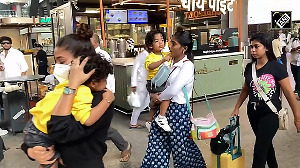In view of the extremely inimical relations between the government and the Opposition there may well be a possibility that the latter decides to push the envelope and claim its right to punish offences against the authority and dignity of the House, says Rajeev Sharma.

The decision of the Congress and the Communist Party of India-Marxist to move a privilege motion against Union Human Resource Development Minister Smriti Irani is at worst an embarrassment for her, but does not pose an existential crisis for the actor-turned-politician in the political sense.
This is because a large percentage of privilege motion notices are rejected and it is only in a handful of cases that penal action is recommended against the person accused of breaching parliamentary privileges.
Perhaps the most notable case in this context was against former prime minister Indira Gandhi 38 years ago when the then home minister Charan Singh had moved a resolution of breach of privilege against her following observations made by the Justice Shah Commission which probed excesses during the Emergency.
Indira Gandhi, who had just won Lok Sabha seat from Chikmagalur, was expelled from the House.
What is a privilege motion? Who can move it, against whom, under what circumstances and under what rules? Which are other important motions in Indian parliamentary procedures? These are the fundamental questions about this little-known but frequently-in-the-news topic. Here is a pithy explainer.
A privilege motion can be moved by any lawmaker against anyone accused of breaching parliamentarians' privileges, their special rights and immunities.
Each of the two houses, the Lok Sabha and the Rajya Sabha, has separate privilege committees, made up of their members. The presiding officers of the two Houses, the Speaker and the Chairperson respectively, can dismiss privilege notices, or refer them to the privilege committee, or get a sense of the House before taking a decision.
In the Lok Sabha, a privilege motion can be moved under Rule No 222 in Chapter 20 of the Lok Sabha Rule Book while in the Rajya Sabha it can be moved under Rule 187 in Chapter 16 of the Rajya Sabha rule book.
Under the rules in the respective houses, a member may, with the consent of the Speaker or the Chairperson, raise a question involving a breach of privilege either of a member or of the House or of a committee thereof provided that the notice is given before 10 am and the matter pertains to an incident of recent occurrence.
In the present case against Irani, if the notice is admitted, the House committee can summon and question her and recommend action. Past experience shows that in a large percentage of cases the privilege motions are kept pending or are withdrawn following an apology from the accused.
The current episode may well chart a different course and go for a long haul given the highly acerbic and bitter relations between the Narendra Modi government and the Opposition.
In view of the extremely inimical relations between the government and the Opposition there may well be a possibility that the latter decides to push the envelope and claim its right to punish as contempt actions which, while not breach of any specific privilege, are perceived offences against the authority and dignity of the House.
Apart from the privilege motion, there are five more important motions in Indian Parliament which are given below in alphabetical order.
- Adjournment Motion, which seeks adjournment of the business of the House for the purpose of discussing a definite matter of urgent public importance.
- Calling Attention Motion, which calls the attention of a minister to any matter of urgent public importance and the minister may make a brief statement or ask for time to make a statement at a later hour or date.
- Censure Motion, which seeks to censure the government for its 'lapse' as the Opposition expresses its lack of confidence in the council of ministers.
- Cut Motion, which seeks reduction in the amount of a demand presented by the government. There are three types of cut motions -- Disapproval of Policy Cut, Economy Cut, Token Cut.
- No-Confidence Motion is the most serious of all. Under this parliamentary provision, a member moves this motion to express lack of confidence in the government for any reason.
If the government fails to get required majority of votes during voting after a debate, the government has to bow out of office.











 © 2025
© 2025